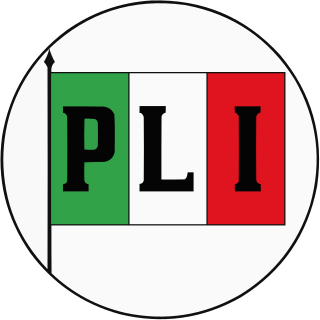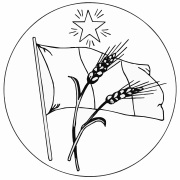
Christian Democracy was a Christian democratic political party in Italy. The DC was founded on 15 December 1943 in the Italian Social Republic as the ideal successor of the Italian People's Party, which had the same symbol, a crusader shield. As a Catholic-inspired, centrist, catch-all party comprising both centre-right and centre-left political factions, the DC played a dominant role in the politics of Italy for fifty years, and had been part of the government from soon after its inception until its final demise on 16 January 1994 amid the Tangentopoli scandals. Christian Democrats led the Italian government continuously from 1946 until 1981. The party was nicknamed the "White Whale" due to its huge organisation and official colour. During its time in government, the Italian Communist Party was the largest opposition party.

Forza Italia was a centre-right political party in Italy with liberal-conservative, Christian-democratic, liberal, social-democratic and populist tendencies. Its leader was Silvio Berlusconi, who served as Prime Minister of Italy four times.

The Democrats of the Left was a social-democratic political party in Italy. Positioned on the centre-left, the DS, successor of the Democratic Party of the Left (PDS) and the Italian Communist Party, was formed in 1998 upon the merger of the PDS with several minor parties. A member of The Olive Tree coalition, the DS was successively led by Massimo D'Alema, Walter Veltroni, and Piero Fassino, and merged with Democracy is Freedom – The Daisy and a number of minor centre-left parties to form the Democratic Party in October 2007.

The Union of the Centre, whose complete name is "Union of Christian and Centre Democrats", is a Christian-democratic political party in Italy. Lorenzo Cesa is the party's current secretary; Pier Ferdinando Casini was for years the most recognisable figure and de facto leader of the party, before eventually distancing from it in 2016. The UdC is a member of the European People's Party (EPP) and the Centrist Democrat International (CDI), of which Casini was president from 2004 to 2015.

The Italian Democratic Socialists were a social-democratic political party in Italy. The party was the direct continuation of the Italian Socialists, the legal successor of the historical Italian Socialist Party. The Italian Democratic Socialist Party, the other long-time Italian social-democratic party, was merged into it along with other minor parties. The party's long-time leader was Enrico Boselli, a former president of Emilia-Romagna (1990–1993). In 2007, the SDI were merged with other descendants of the PSI to form the modern-day Italian Socialist Party.

Democracy is Freedom – The Daisy, commonly known simply as The Daisy, was a centrist political party in Italy. The party was formed from the merger of three parties within the centre-left coalition: the Italian People's Party, The Democrats and Italian Renewal. The party president and leader was Francesco Rutelli, former mayor of Rome and prime ministerial candidate during the 2001 general election for The Olive Tree coalition, within which The Daisy electoral list won 14.5% of the national vote.

The Italian Republican Party is a political party in Italy established in 1895, which makes it the oldest political party still active in the country. The PRI identifies with 19th-century classical radicalism, as well as Mazzinianism, and its modern incarnation is associated with liberalism, social liberalism, and centrism. The PRI has old roots and a long history that began with a left-wing position, being the heir of the Historical Far Left and claiming descent from the political thought of Giuseppe Mazzini and Giuseppe Garibaldi. With the rise of the Italian Communist Party and the Italian Socialist Party (PSI) to its left, it was associated with centre-left politics. The early PRI was also known for its anti-clerical, anti-monarchist, republican, and later anti-fascist stances. While maintaining those traits, during the second half of the 20th century the party moved towards the centre on the left–right political spectrum, becoming increasingly economically liberal.
Liberalism and radicalism have played a role in the political history of Italy since the country's unification, started in 1861 and largely completed in 1871, and currently influence several leading political parties.

The Italian Socialist Party was a social-democratic and democratic-socialist political party in Italy, whose history stretched for longer than a century, making it one of the longest-living parties of the country. Founded in Genoa in 1892, the PSI was from the beginning a big tent of Italy's political left and socialism, ranging from the revolutionary socialism of Andrea Costa to the Marxist-inspired reformist socialism of Filippo Turati and the anarchism of Anna Kuliscioff. Under Turati's leadership, the party was a frequent ally of the Italian Republican Party and the Italian Radical Party at the parliamentary level, while lately entering in dialogue with the remnants of the Historical Left and the Liberal Union during Giovanni Giolitti's governments to ensure representation for the labour movement and the working class. In the 1900s and 1910s, the PSI achieved significant electoral success, becoming Italy's first party in 1919 and during the country's Biennio Rosso in 1921, when it was victim of violent paramilitary activities from the far right, and was not able to move the country in the revolutionary direction it wanted.

The Italian Liberal Party was a liberal political party in Italy.

The Democratic Alliance was a social-liberal political party in Italy.

The Italian People's Party was a Christian-democratic, centrist and Christian-leftist political party in Italy. The party was a member of the European People's Party (EPP).

Italian Renewal was a centrist and liberal political party in Italy.

The Italian Socialists were a minor social-democratic political party in Italy active from 1994 to 1998. The party was the legal successor of the Italian Socialist Party (PSI), following its dissolution by the 47th Party Congress due to the severe financial crisis following the Tangentopoli scandal. A minoritarian group of the congress, who proposed an autonomist and centrist solution against the PSI dissolution, instead founded the Reformist Socialist Party.

The Italian Democratic Socialist Party, also known as Italian Social Democratic Party, was a social-democratic political party in Italy. The longest serving partner in government for Christian Democracy, the PSDI was an important force in Italian politics, before the 1990s decline in votes and members. The party's founder and longstanding leader was Giuseppe Saragat, who served as President of the Italian Republic from 1964 to 1971. Compared to the like-minded Italian Socialist Party on the centre-left, it was more centrist but identified with the centre-left.

The Democratic Union for the Republic was a short-lived Christian-democratic and centrist political party in Italy.

The Segni Pact, officially called Pact of National Rebirth, was a Christian-democratic, centrist and liberal political party in Italy. The party was founded and named after Mario Segni, a former member of the Christian Democrats who was a prominent promoter of referendums.

The National Democratic Alliance was a short-lived liberal political party in Italy.

The Legislature I of Italy was the 1st legislature of the Italian Republic, and lasted from 8 May 1948 until 24 June 1953. Its composition was the one resulting from the general election of 18 April 1948.
The centre-left coalition is an alliance of political parties in Italy active, under several forms and names, since 1995 when The Olive Tree was formed under the leadership of Romano Prodi. The centre-left coalition has ruled the country for more than 26 years between 1996 and 2022.


















